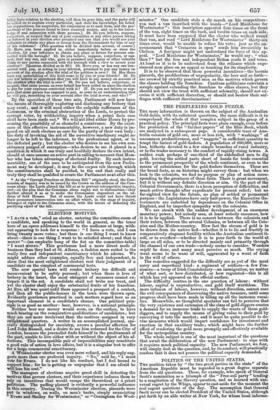ELECTION MOTIVES.
" I HAVE a vote," cried an elector, entering the committee-room of a candidate, and speaking to the world in general, as the tenor hero of an opera addresses himself to the audience at large, with- out appearing to look for a response : "I have a vote, and I can bring twenty more votes ; but there is one thing I want to know about—there is one thing I want to be satisfied about ; and that is MONEY "—(an emphatic bang of the fist on the committee-table) " I want MONEY." This gentleman had a more direct mode of business than they had at St. Albans, a fashion more suited to the really free and independent constituency which he adorns. We might adduce other examples, equally free and independent, to show that the most enlightened electors rest their judgment of a candidate on the simplest of commercial tests. The new special laws will render bribery too difficult and inconvenient to be safely pursued ; but when there is love of bribery in the heart, the most stringent of measures cannot ex- tirpate it in the act. A candidate shall not bribe nor treat, and yet the elector shall enjoy the substantial fruits of his franchise. At Rye, all was quiet until there appeared a prospect of a contest, and then all the public-houses in the town were thrown open. Evidently gentlemen practised in such matters regard beer as an important element in a candidate's chance. One political prin- ciple is as good as another : beer, however, is a national principle.
Neither beer nor money would seem, on the surface, to have much bearing on the comparative qualifications of candidates ; but they are not more irrelevant than the motives assigned in very enlightened quarters. A writer in an accomplished journal, spe- cially distinguished for casuistry, avows a peculiar affection for Lord John Russell, and a desire to see him returned for the City of London, because the journalist finds himself in the predicament of the poet, unable to live either with or without the object of his af- fections. This incompatible pair of impossibilities may constitute a good rule of action in love affairs, but it is a singular test to offer for a large commercial constituency.
A Westminster elector was even more refined, and his reply sug- gests more than one profound inquiry. "No," said he, "I must vote for Evans. I do not like his conduct, but I feel bound to support him ; for he is getting so unpopular that I am afraid he will lose his seat."
The managers of elections acquire great skill in detecting the motives that govern electors, and their experience induces them to rely on incentives that would escape the theoretical or a priori politician. The puffing placard is evidently a powerful influence in this country. During the Westminster election, placards were put in windows, on walls, on men's backs, simply enunciating I "Evans and Shelley for Westminster," or " Coninghani for West- I
minster." One candidate stole a sly march on his competitors : you met a van inscribed with the words—" Lord Maidstone for Westminster " : this inscription appeared four times on the front of the van, eight times on the back, and twelve times on each side. It must have been supposed that the elector who walked round that van, and read "Lord Maidstone for Westminster" thirty-six times over, would be unable to refuse his vote ; just as the an- nouncement that " Cremorne is open" sends him irresistibly to Chelsea. A foreigner might not understand the force of this ap- peaL "Lord Maidstone for Westminster," he would say ; "what
then ?" but the free and independent Briton reads it and votes. At least so it is to be understood from the reliance which expe- rienced men place on an appeal so touching for its simplicity. It is to be observed that these powerful incentives—the laconic placards, the predilections of unpopularity, the beer and so forth— are avowed by strictly practical men as the motives which govern the classes holding the franchise. Cautions politicians entertain a scruple against extending the franchise to other classes lest they should not view the trust with sufficient solemnity, should not ex- ercise it with sufficient discretion, or should not bestow their suf- frages with sufficient discrimination !


























 Previous page
Previous page